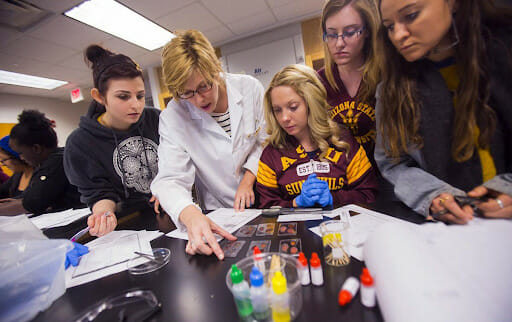Helping undergraduate students get more hands-on research experience

Research Experiences for Undergraduate Students, a program of the National Science Foundation, is a source of additional funding that can be added to a new or existing NSF proposal to boost active research involvement and provide meaningful research experiences for undergraduate students.
There is a simple and easy application process to add these exciting opportunities to NSF proposals/awards.
For more information, contact the unit’s Research Advancement (RA) Staff.
NSF Research Experience for Undergraduate Students: REU quick fact sheet
What is an REU?
An REU is a supplemental program which can be added to new NSF proposals or existing NSF awards. The additional funding creates more opportunities to offer hands-on research experiences for undergraduate students. REU opportunities can only be offered to students who are US citizens, US nationals, or permanent residents of the United States.
What NSF directorates offer REU funding?
REU supplement funding is a foundation-wide program and REU proposals are welcome in any of the NSF supported research areas. For more guidelines about applying, contact the unit RA staff.
Who can apply for an REU?
Any new (or renewal) NSF proposal or current NSF award may include the necessary supplementary information to apply for a REU.
For new submissions, a three page scope of work detailing the REU is included in the Supplementary Documents. A budget and budget justification are included with the proposal.
For requests to an existing award, an application containing the same information as mentioned above can be submitted for additional funding. This is done through a supplemental funding request at research.gov.
NOTE: Prior to including a request for an REU, contact the program officer for the related research program (new/renewal proposal) or the program officer for the award (existing awards – unless in response to a Dear Colleague Letter or specific REU Supplement calls).
For specific guidance with application preparation, contact the Unit RA.
Necessary documents for REU application
Scope of work (3 pages)
- Nature of each prospective student’s involvement in research project
- Experience of the PI/research mentors in involving undergraduates in research, including any previous REU supplement support and the outcomes
- Nature of the mentoring that the students will receive
- Process and criteria for selecting the student(s)
- If a student has been preselected, grounds for selection and brief biosketch of the student should be included
Budget
- All money should be entered as participant support costs (excluded from F and A)
- Guidelines:
- Fund can be requested for up to two students (exceptions made)
- Student stipends for summer projects — $600 per student per week
- Other cost include: housing, meals, travel and lab use fees
- Total summer cost typically do not exceed $1,350 per student per week. The budget request for an academic year REU should be comparable, on a pro rata basis.
Budget justification
Separate section of the budget justification, detailing proposed REU expenses.
For Unit RAs: Applying For and Administering NSF Research Experience for Undergraduate Awards